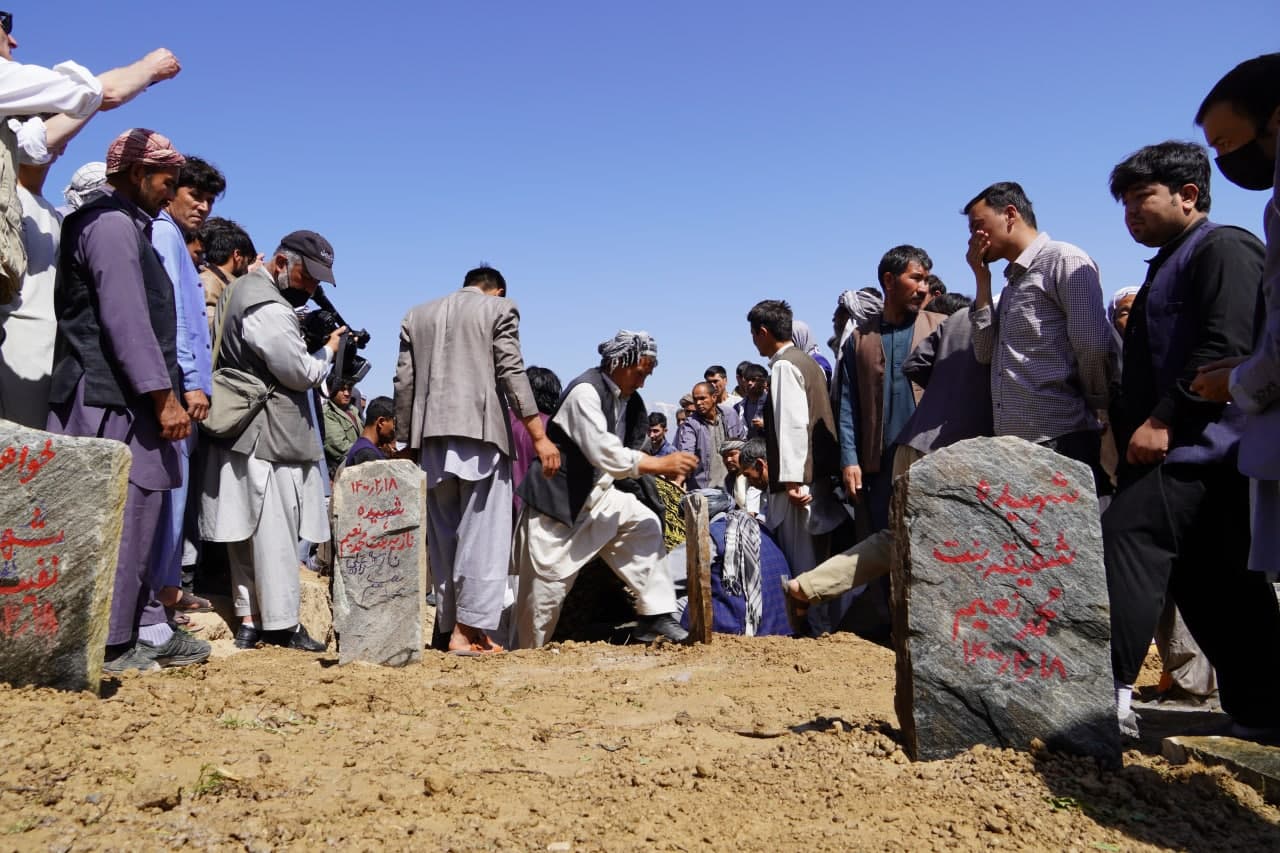A group of men, wearing mournful and shocked faces, carry a coffin inside which a young dead student lies: Aqeela who lost her life to Saturday’s suicide bombing that targeted schoolgirls in the predominantly Hazara neighborhood of Dasht-e-Barchi in western Kabul. The men placed Aqeela’s dead body carefully in one of the many graves dug to swallow the victims of a bombing that so far has claimed 85 lives and wounded 240 people—mostly schoolgirls.
A religious leader, wearing a white turban, stepped into the grave where Aqeela’s body was waiting for the last ritual words the Shia mullah reads over every dead Muslim before a pile of freshly excavated soil is shoveled down to bury him under the earth. The white turbaned mullah murmured a prayer in Arabic and stepped out of the grave. Another young man, with a slightly dark face, stepped into the grave and placed three flat stones on Aqeela’s dead body wrapped in a white piece of cloth. Another young man handed over a metal bucket full of soft mud to the man in the grave. He carefully plastered the interstices among each stone with his right hand and stepped out of the grave. Four men, with an inexplicable hurriedness, took shovels and loaded down piled of soil on her dead body. A lump of soil hunched as the men shoveled the last little bit of soil and leveled them on Aqeela’s grave. Another man, looking in his early 30s, placed a tall flat stone in the center of the grave. A young man stepped forward and sat down cross-legged before the gravestone and with blue permanent ink marker wrote: Shahid Aqeela Baywaris. Martyr Aqeela, the heirless—literally meaning a dead person who has no family member.
Manifestation of survivor’s guilt gleamed in sunlight beaten eyes of a man showed the camera a blood-stained notebook: the only emblem that might connect the yet behindhand unaware family members of the dead Aqeela to her grave on a hilltop in the western neighborhood of the capital Kabul. Shahid Aqeela Baywaris was one of the 62 people who so far have lost their lives to Saturday’s bombing.

In that moment of grief, Aqeela’s death put a testimonial stamp on a long history of sectarian violence that targets the Hazara community in Afghanistan. The school bombing on Saturday was a thread similar to bloody attacks that target school students. In August 2018, a suicide bomber detonated his explosives at an education center in Dasht-e-Barchi, killing at least 48 school students and wounded 38 others. In October 2020, another suicide bomber killed at least 30 students and wounded 70 others. The Taliban denied responsibility for the attacks but the self-proclaimed Islamic State Khurasan Province (ISKP) militants claimed responsibility for the first and second carnages.
The Saturday bombing still remains unclaimed. The Afghan government as usual condemned the attacks and blamed the Taliban for them. The Taliban, though denied involvement in the attack, the has not dared to declare suicide bombing as haram—a religiously forbidden act.
Caught between a sectarian terror and incompetent security agencies, the Hazaras of Afghanistan have learned nothing but to stay strong against the monstrous acts of terror that systemically targets the youngest segment of the community who carry the beacon of hope against despair in a dark time of their history.
The day after Saturday’s bombing, young schoolgirls rushed to the site of the deadly blast and recited obituary poems in the memories of the lost students. A young schoolgirl, who had come to attend an obituary ceremony, stood firm before the camera and sent a vivid message to her persecutors: “We will defeat you by the power of our pens.” A blind mother, who had lost her daughter to Saturday’s bombing, cleaned her tears in a way as if she was doing a life ritual and told the camera that terrorists who blew themselves to kill innocent students would never be able to change their strong determination. Another young schoolgirl, who had come to attend the obituary ceremony, looked straight to camera as though looking at the eyes of those who blow themselves up to run down the knowledge-loving spirit of the community and said: “You coward, stab in the back. You cannot defeat us.”
United in grief in the aftermath of the bombing, the community stood strong to send a powerful message to the world. Young and old, teacher and shopkeeper, activists and workers sent a single message as they collected body pieces of their dear and near ones. “Do not be afraid, stand up and break the silence. We are Muslims and followers of Mohammad. Stay strong and united and guard your schools,” said an old man in a loud voice addressing a mourning crowd in the site where the car bomb went off.
No doubt it is the most painful experience on earth to lose your dear ones in a suicide blast. But the power of love and ambition—love of a human and ambition for knowledge— magically equips the Hazara community to endure the pain of loss and imagine a better world for posterity. A genuine human virtue exists in the resisting spirit of the old man who preached his community to stand united and strong against the evil of racial and sectarian violence. The powerful ambition for knowledge that has filled the spirit of the Hazara community is a virtue that will break sickness in the heart of darkness. Today’s school students are tomorrow’s prophets whose dream never dies.




